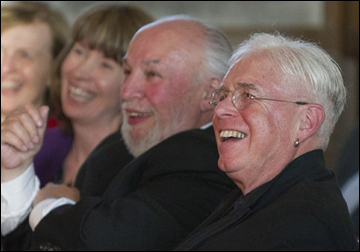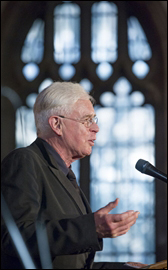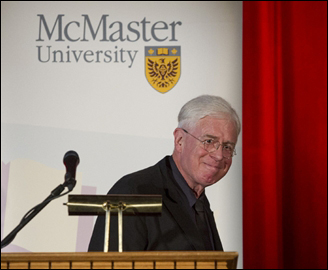Bruce Cockburn’s 32 songbooks are described as the heart of the McMaster library Archive collection.
Bruce Cockburn’s 32 songbooks are described as the heart of the McMaster library Archive collection.
May 3, 2013 – The date on the notebook page is April 11, 1983. Bruce Cockburn was in the midst of putting together songs for Stealing Fire, the politically charged album that would finally gain the Canadian musical icon recognition in the United States, lionized by the left and vilified by the right.
You can see that Cockburn returned to this page several times. The handwriting starts off in green ink, but there are edits in black and then blue. Scribbles and deletions criss-cross the page.
On the right-hand side is a hastily scrawled margin, encasing a list of more than 25 words. Each one rhymes with hate.
The page displays no title, but this where Cockburn’s If I Had a Rocket Launcher took shape — at least on paper, the inspiration for the controversial song came two months earlier during a visit to a Guatemalan refugee camp.
The words “shot down” are replaced by the more direct “murdered.” The name of Guatemalan dictator “Rios Montt” is simplified to “generals.”
Surprisingly, the phrase “that son of a bitch would pay” is lined out for “I’d make somebody pay.”
The stricken phrase eventually returns in Cockburn’s final edit to close the song with the chilling “some son of a bitch would die.”
The pocket-sized black book is one of 32 found in the Bruce Cockburn Collection, a new addition to the McMaster University Archives at Mills Memorial Library.
As well as the notebooks, the collection consists of correspondence, recordings, films, scrap books, awards, photos, T-shirts, hats and assorted memorabilia.
Cockburn has even parted with three of his prized guitars — a 12-string Guild, a Little Martin travel guitar, and a handcrafted Manzer with quotations by former Czech president Vaclav Havel and French philosopher Jean-François Lyotard written on its body in silver marker.
In all, the collection takes up 63 boxes of varying size. The carefully prepared catalogue, listing every item, takes up 64 pages.
The correspondence includes letters and acknowledgments from Oscar-winning actress Vanessa Redgrave, environmentalist David Suzuki, former cabinet ministers John Crosbie and Lloyd Axworthy, Grateful Dead guitarist Jerry Garcia, singer Anne Murray and former Governor General Adrienne Clarkson.
It’s the 32 notebooks, however, that form the collection’s core. They cover the years 1969 to 2002 and show how Cockburn’s songs took shape, the outpourings of a creative mind at work. Among the random thoughts and jottings are remnants of poetry, recipes, drawings and doodles, even reminders on how to make overseas phone calls.
“For years, I made a pretty religious practice of carrying around a notebook with me all the time because I found that if I got an idea and I didn’t write it down right away, it was gone,” Cockburn said in an interview Wednesday from his home in San Francisco, where he has recently settled with his wife, MJ, and 18-month-old daughter, Iona.
“It’s like dreams. You tell yourself you’re going to remember that dream, but if too many conversations go by before you get it in writing, you’re not going to remember it.”
Cockburn said McMaster officials first approached him about acquiring his collection in 2009 after the university presented him with an honorary doctorate.
“It’s something I hadn’t given a lot of thought to other than in a very general way. I had been saving all this stuff and at one point I figured I might try to see if somebody was interested in taking it over,” said Cockburn, 67.
“McMaster approached me and asked if I was interested … It’s a major university and they were interested. I figured they would treat it with respect.
“I gave them everything I had collected up until the year 2000, basically. I didn’t give them family photographs and things like that. It’s stuff that is related to my so-called career, however tangentially. There is quite a range of stuff but it all has something to do with my time in the music world.”
May 3, 2013 – Canadian songwriter Bruce Cockburn was at McMaster University Tuesday night to take part in a celebration of his recent donation of a huge chunk of his personal archives to McMaster University.

It’s hard to be humble when one of Canada’s top academic institutions enshrines your life’s work alongside collections representing the careers of philosopher Bertrand Russell, and authors Farley Mowat, Margaret Laurence and Pierre Berton.
But Canadian music icon Bruce Cockburn managed to be just that Tuesday night at a reception to honour the donation of his personal notebooks, correspondence, recordings, photos and memorabilia to the McMaster University archives.
The Ottawa-born writer of songs such as Lovers in a Dangerous Time and If I Had a Rocket Launcher sat quietly in the front row at Convocation Hall, listening to a string quartet perform instrumental versions his music.
Cockburn, 67, then heard university provost David Wilkinson tell the 180 invited guests and dignitaries assembled there what a significant gift the collection represents to the institution.

When called to the stage to say a few words, Cockburn bashfully downplayed the importance of his gift.
“I want to thank McMaster University for graciously accepting all my crap,” joked Cockburn, who is known almost as much for his social activism as for his music.
Cockburn spoke for about 10 minutes, relating anecdotes from a career that spans five decades. He told the audience about the time he brought a shoulder bag filled with unarmed landmines to an anti-mine news conference at Parliament Hill, much to the chagrin of the Centre Block security guards.
“My major regret is that I couldn’t include those landmines in the donation to McMaster,” Cockburn deadpanned. “But I had to give them back.”
During the reception, several artists performed versions of Cockburn’s songs. The rock group Of Gentlemen and Cowards, all of whom are former McMaster students, sang an acoustic version of Wondering Where the Lions Are.
Hamilton’s Tom Wilson sang All the Diamonds and Colin Linden, who flew in from Nashville for the event, sang Anything Anytime Anywhere.
Wilson and Linden are members of the group Blackie and The Rodeo Kings and are longtime friends and collaborators of Cockburn.

The Cockburn collection is stored in 63 boxes of varying size in the basement of McMaster’s Mills Memorial Library. It includes correspondence from notable figures such as former governor general Adrienne Clarkson, former cabinet ministers Lloyd Axworthy and John Crosbie, environmentalist David Suzuki, Oscar-winning actress Vanessa Redgrave and singer Anne Murray.
The collection also includes fan letters, photos, tour shirts, recordings, videos and guitars, all carefully catalogued in a 64-page finders’ guide for researchers.
The core of the archives, however, is found in 32 personal notebooks, in which Cockburn wrote many of his songs, as well as snippets of poetry and day-to-day observations.
The notebooks, which cover the years 1969 to 2002, offer insight into how Cockburn worked his songwriting craft.
“That process is documented in the mongrel assortment of stationery that is now in the hands of McMaster,” he said.
Credit: Cockburn thanks Mac for taking his ‘mongrel assortment by Graham Rockingham – thespec.com. Photos by Scott Gardener / The Spec.
Related Posts:
Related Links: